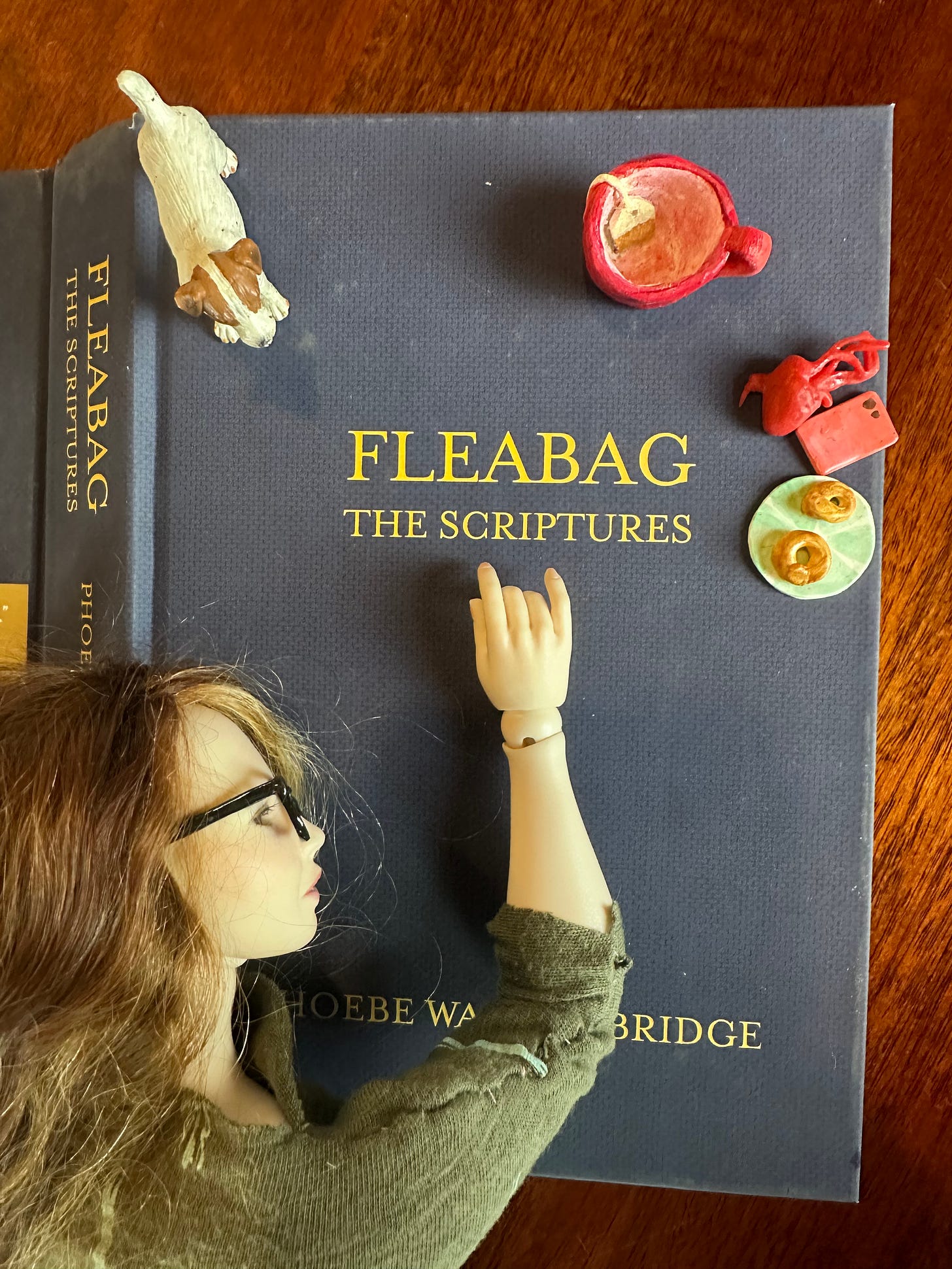There is a moment in the show Fleabag (season two, episode 4) that brings me to my knees everytime I watch it. The desperate main character, Fleabag, played by the author Phoebe Waller-Bridge, is haunted by her own betrayal of her best friend in this one step forward, two steps back transgressive comedic delight. And like all great comedies, when the tragedy hits, it hits hard because you think the laughs are going to keep on coming, because that’s the way we humans are. It’s all fun and games until…it isn’t: then we have to figure out how to pick up the pieces and move forward again.
This is the moment when Fleabag finally begins to face her feelings—in a confessional, talking to a priest.
FLEABAG:
I think I just want someone to tell me how to live my life, Father, because so far, I think I’ve been getting it wrong.
(beat)
And I know that is why people want people like you in their lives. Because you just tell them how to do it. You just tell them what to do. And what they'll get out of the end of it. And even though I don't believe your bullshit and I know that scientifically nothing I do makes any difference in the end anyway, I'm still scared, why am I still scared?
(beat)
Just fucking tell me what to do, Father.
Silence. She looks to the grate. She can't make out his expression. A long pause.
PRIEST:
Kneel.
(beat)
FLEABAG:
What?
(beat)
PRIEST:
Kneel.
(beat)
Fleabag is stunned
(beat)
PRIEST: gently
Just kneel.
She kneels.
The vulnerability of this moment, when she kneels, and acknowledges she needs help to find a path forward is so profound for me—the pauses (beats) amplify the dialogue like exclamation marks.
They say the first step to fixing something is to acknowledge the problem. James Baldwin said, “Not everything that is faced can be changed, but nothing can be changed until it is faced.” I learned that lesson in AA way back in my teen years, and then again in business, and then again with parenting. But now that I’m a little older, I think there’s another step that comes first—acknowledging the chaos and the fear we feel first, like Fleabag.
I don’t know exactly what’s happening with the world, but I do recognize fear, avoidance, irritation, sadness, and outrage everywhere I go. On Tuesday, I talked to my therapist about the feeling I get from feeling other people’s anxiety — it often overwhelms me and I want to either hide from it, or cry. I’m not a medium or anything, no bona fides other than being a quiet middle child who watches people. Anyway, the next day I read a J. Peder Zane’s commentary from Real Clear Politics. In it, he quotes some alarming statistics that validated the vibration of heightened emotion that I sense all around me. Here’s a snapshot:
In a Wall Street Journal commentary about post-COVID America, Yale University’s Nicholas Christakis observes how “reckless behavior” is becoming epidemic. “Americans gambled a record $66.5 billion in 2023. Compared with 2019, there has been an 18% increase in fatal accidents involving alcohol and a 17% increase in those involving speeding. Over 500 Americans are dying every day from alcohol-related deaths, a 30% increase. Sexually transmitted diseases are rising across the nation, too.”
Jonathan Haidt reports in the Atlantic that “rates of depression and anxiety in the United States – fairly stable in the 2000s – rose by more than 50 percent in many studies from 2010 to 2019. The suicide rate rose 48 percent for adolescents ages 10 to 19. For girls ages 10 to 14, it rose 131 percent.” A CNN and Kaiser Family Foundation poll published in 2022 found that more than 20% of adults described their mental health as “fair” or “poor,” and about one-third of adult respondents said they feel anxious much of the time.
A 2021 study by the Survey on American Life found that 49% of Americans said they had fewer than three close friends – in 1990 the figure was 27%. That same year 33% of respondents said they had 10 or more close friends; in 2021 that number fell to 13%.
Zane thinks this ^^ is the biggest problem our nation is facing right now; not China, not Trump or Biden. Zane says we are the biggest problem—how we take care of ourselves and each other.
I heard a podcast (can’t remember which one, dammit) where the host suggested we all are living dual lives with our commitment to consumption of entertainment, news, and social media. He said it’s like having an affair, cheating on your real life. It undermines our agency, because the time we commit to this other digital life is time we are not actively engaged in our own lives.
A Jan 31, 2024 article from Datareportal says, “the “typical” social media user now spends 2 hours and 23 minutes per day using social platforms.” That doesn’t include texting, Fortnight, or watching the latest episode of the Kardashian’s, either. This isn’t other people, it’s me too. My phone is my information-binky.
Me:
Bless me, Father, for I have sinned.
Priest:
How long has it been since your last confession you last used the bathroom without your phone?
Me:
Last month, in the middle of the night.
(beat)
Me:
Father?
(beat)
Me:
Father, are you there?
(beat)
Priest:
Oh, sorry. I was just responding to a text real quick—Idle hands are the devil’s workshop, you know. Anyway, it was the Bishop. Where were we?
I applaud the people who haven’t been sucked in. You are our future.
-n






That last bit! Ha!
It scares the living hell out of me to think how much time I’ve wasted on this damn device.
I do hope for a future less attached. More involved.
Really good stuff, Nina! Fantastic Fleabag frame, scary stats, and reflection that resonates. Yes, please—more time with friends like you, please!